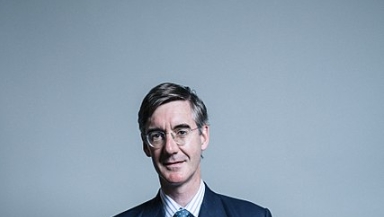Conservatives of every persuasion are currently getting very excited about MP Jacob Rees-Mogg's performance in a televised interview with the BBC's Jo Coburn. In a segment on the Daily Politics programme, the Conservative MP for North-East Somerset was rather savagely questioned on the political implications of his Catholic faith, in a manner reminiscent of the repeated grillings that eventually burned the career of former Lib Dem leader Tim Farron. Various commentators – and the Bishops of Shrewsbury and Paisley – have expressed their outrage at the interview, in which Coburn attempted to pin down Rees-Mogg on his views on same-sex marriage and abortion. They've also been full of praise at the politician's apparently-skilful handling of his attacker, who was again posing the increasingly pertinent question: can a religious believer hold a high political office?

Rees-Mogg's strategy was simple. As Coburn repeatedly asked him his views, and whether he'd like to see law changes around these issues, the MP – whose views take on great importance because he's tipped to one day lead his party – stood behind the historic teachings of the Catholic church. He nodded, if not terribly convincingly, to tolerance within his own views, but his main response seemed to be that it didn't really matter what he thought; the will of the general population was in opposition, and he has to accept that.
Contrast this with the somewhat sad story of Tim Farron who, after initially indicating that he held fairly liberal views in line with those classically demonstrated by his party, had a crisis of conscience and set the record straight. As an evangelical Christian, he couldn't sub-contract responsibility for his opinions to a powerful historic institution, and instead had to admit his beliefs were based on a personal interpretation of the Bible. Criticism came at him from all quarters: from those dismayed that he hadn't been honest in the first place, and from those who found his views abhorrent and unsuitable for an unbiased leader.
In the Daily Politics segment, Rees-Mogg does handle Coburn an awful lot better than Farron dealt with his various interviewers. He constantly changes the territory of the argument, and repeatedly tries to put the journalist on the back foot. He invokes Catholic teaching as a defence, knowing that he can claim religious intolerance if it's called into question, and he wisely tries to point to positives – such as the miracle of life, when asked about pregnant gay Tory colleague Ruth Davidson MSP – instead of getting bogged down in criticism of others. But does he really do a better job than Farron of honestly representing his faith?
It seems to me that all Rees-Mogg did was perform a much better evasion of this sadly-familiar line of media questioning. And in doing so actually, he potentially adds weight to the idea that you can't hold political office and practice a faith with absolute integrity. To any viewer reading between the lines, it sounded like the MP absolutely would love to see abortion and gay marriage outlawed – but that he simply knew that such a view would be regarded intolerant and unpalatable.
Talking of intolerance though, it is remarkable (and yes, worrying) that interviewers feel able continually to pick at the private views of Christian political leaders, when it seems unlikely that the same treatment would be applied to those of a different belief system. Rees-Mogg was quite right in the interview to take aim at what he called 'liberal tolerance', which is of course a kind of selective intolerance by a misleading name.
To hold up Rees-Mogg as a model for how such intolerance should be handled however, feels like a mistake. If he truly seeks to lead, then surely he has to be brave enough to step out of the shadow of his institutional protector, and express both his own beliefs, and why they won't prejudice his judgement as fair governor. Anything less is just that sad, familiar old game of politics, the kind that truly prophetic radical Christian leadership might actually be able to subvert.
Martin Saunders is a contributing editor for Christian Today and the deputy CEO of Youthscape. Follow him on Twitter @martinsaunders













